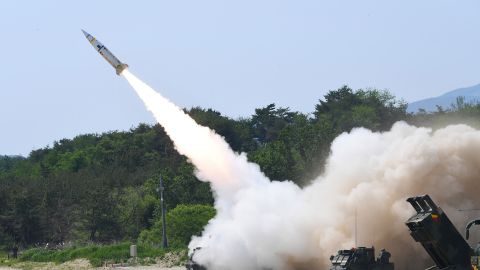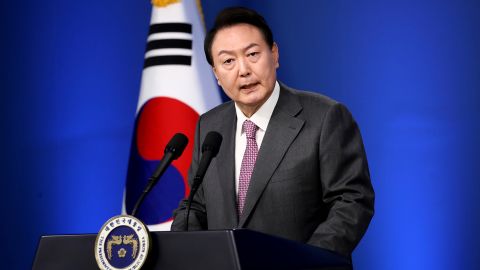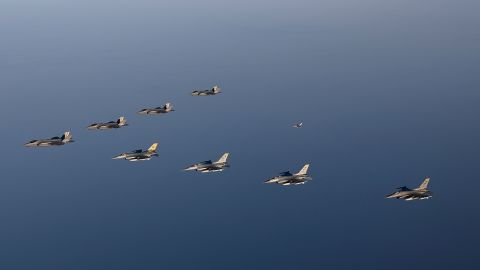Seoul
CNN
—
They have them, so we need them.
That is the fundamental argument for South Koreans who want their country to develop its own nuclear weapons. It’s about the need to protect themselves from an aggressive northern neighbor that is already a nuclear power in all but name and whose leader Kim Jong Un has vowed an “exponential increase” in his arsenal.
The counter-argument, which has has long stopped Seoul from pursuing the bomb, lies in the likely consequences. Developing nukes would not only upset the country’s relationship with the United States, it would likely invite sanctions that could strangle Seoul’s access to nuclear power. And that is to say nothing of the regional arms race it would almost inevitably provoke.
But which side of the argument South Koreans find themselves on appears to be changing.
Ten years ago, calling for South Korean nuclear weapons was a fringe idea that garnered little serious coverage. Today it has become a mainstream discussion.
Recent opinion polls show a majority of South Koreans support their country having its own nuclear weapons program; a string of prominent academics who once shunned the idea have switched sides; even President Yoon Suk Yeol has floated the idea.
So what’s changed?

For supporters, Seoul developing its own nukes would finally answer the age-old question: “Would Washington risk San Francisco for Seoul in the event of nuclear war?”
At present, South Korea comes under Washington’s Extended Deterrence Strategy, which includes the nuclear umbrella, meaning the US is obligated to come to its aid in the event of attack.
For some, that is enough reassurance. But the details of exactly what form that “aid” might take aren’t entirely clear. As that age-old question points out, faced with the possibility of a retaliatory nuclear strike on US soil, Washington would have a compelling reason to limit its involvement.
Perhaps better not to ask the question then. As Cheong Seong-chang of the Sejong Institute puts it, “If South Korea has nuclear weapons, we can respond ourselves to North Korea’s attack, so there is no reason for the United States to get involved.”
There are other reasons for South Koreans to question their decades-old leap of faith in US protection, too. Looming large among them is Donald Trump. The former US president, citing the expense involved, made no secret of his desire to pull 28,500 US troops out of South Korea and questioned why the US had to protect the country. Given Trump has already announced his presidential bid for the 2024 election that’s an issue that still plays heavy on people’s minds.
“The US simply isn’t perceived to be as reliable as it once was,” Ankit Panda of Carnegie Endowment for Peace said. “Even if the Biden administration behaves like a traditional US administration and offers all the right reassurance signals to South Korea… policy makers will have to keep in the back of their mind the possibility of the US once again electing an administration that would have a different approach for South Korea.”
But the loss of faith goes beyond Trump.

More recently, President Yoon Suk Yeol floated the idea of US tactical nuclear weapons being redeployed to the peninsula or South Korea possessing “its own nuclear capabilities” if the North Korean threat intensifies. Washington’s rejection of both ideas has been conspicuous. When Yoon said this month that Seoul and Washington were discussing joint nuclear exercises President Joe Biden was asked the same day whether such discussions were indeed underway. He responded simply, “No.”
Following Yoon’s comments, US Defense Department Press Secretary Brig. Gen. Pat Ryder reiterated the US’ commitment to the Extended Deterrence Strategy, saying that “to date, (the strategy) has worked and it has worked very well.”
In a Chosun Ilbo newspaper interview published on January 2, Yoon said of these guarantees, “it’s difficult to convince our people with just that.”
But in another interview, with The Wall Street Journal on the sidelines of Davos last week, Yoon walked those comments back saying, “I’m fully confident about the US’ extended deterrence.”
An inconsistent message rarely soothes concerns on either side of the argument.
On Thursday, US think-tank, the Center for Strategic and International Studies (CSIS), suggested what might seem a middle ground – the creation of “a framework for joint nuclear planning” that could “help to develop stronger bonds of trust between the allies in the current environment.”
It said this framework could be “similar to a NATO planning group for nuclear weapons use, with planning conducted bilaterally and trilaterally (with Japan) and control remaining in the hands of the United States.”
But the CSIS made clear it did not support “the deployment of US tactical nuclear weapons to the peninsula or condoning South Korea purchasing its own nuclear weapons.”
Other experts too, like Professor Jeffrey Lewis, a nuclear non-proliferation expert at Middlebury Institute in California, see joint planning and exercises as “more realistic options than either nuclear weapons or nuclear sharing.”
For some in Yoon’s conservative party that is simply not enough. They see a nuclear-weapons-free South Korea being threatened by a nuclear-armed North Korea and want nothing less than US nukes redeployed to the Korean Peninsula.
They seem destined to be disappointed. Washington moved its tactical weapons out of South Korea in 1991 after decades of deployment and there are no signs it will consider reversing that decision.
“Putting US nukes back on the peninsula makes no military sense,” said Bruce Klingner of Heritage Foundation.
“They currently are on very hard to find, very hard to target weapons platforms and to take weapons off of them and put them into a bunker in South Korea, which is a very enticing target for North Korea, what you’ve done is you’ve degraded your capabilities.”
That leaves many South Koreans seeing just one option – and some are losing patience.
Cheong, a recent convert to South Korea acquiring the bomb, believes the Extended Deterrence Strategy has already reached its limit in dealing with North Korea and only a nuclear-armed South Korea can avert a war.
“Of course, North Korea does not want South Korea’s nuclear armament. Now they can ignore the South Korean military,” Cheong said.
“But they must be nervous, (because if South Korea decides to pursue the bomb) it has the nuclear material to make more than 4,000 nuclear weapons.”
Still, it’s not just fear of upsetting the relationship with the US that holds Seoul back from such a course. If South Korea were to leave the Nuclear Non-Proliferation Treaty (NPT) the effect on its domestic nuclear power system would likely be swift and devastating.
“First of all, the nuclear suppliers group would cut off fissile material to South Korea, which is reliant for all of its fissile material on outside suppliers. It could lead to international sanctions,” Klingner said.

Then there is the regional arms race it would likely provoke, with neighboring China making clear it will not tolerate such a build up.
“Probably China is going to be unhappy and it’ll basically stop at nothing to prevent South Korea from going nuclear,” said professor Andrei Lankov, long time North Korea expert from Kookmin University.
Given the likely fallout, Seoul might do better to take comfort in the guarantees already on offer from the US.
“The 28,500 US troops on the peninsula have a very real tripwire effect. In the event of a breakout of hostilities between the two Koreas, it is simply unavoidable for the US not to get involved. We have skin in the game,” Panda said.
Finally, there are also those cautioning that even if South Korea did acquire nuclear weapons, its problems would hardly disappear.
“So the funny thing about nuclear weapons is that your weapons don’t offset their weapons,” said Lewis at Middlebury Institute.
“Look at Israel. Israel is nuclear armed and is terrified of Iran getting nuclear weapons, so Israel’s nuclear weapons don’t in any fundamental way offset the threat they feel from Iran’s nuclear weapons.”

